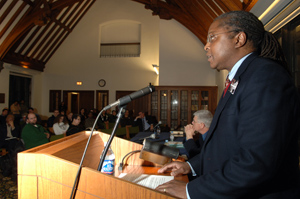|
||
      |
King’s war legacy
Three scholars revisit Martin Luther King Jr.’s declaration against Vietnam in light of the current Iraq war.

By the time King died, said Hopkins, he’d adopted a “radical
sociology and theology.”
What would King do? That was the question, said historian Barbara Ransby, that she and two other scholars had implicitly been asked, but she wouldn’t purport to know how Martin Luther King Jr. would respond to the war in Iraq. Still, all three panelists at the MLK Week discussion, held January 10 in Swift Hall, seemed to have a well-educated hunch.
The program, King: War and the Moral Imperative, used the civil-rights leader’s April 30, 1967, sermon at New York’s Riverside Church as a jumping-off point. In that speech King declared his opposition to the Vietnam War—at a time when much of the press and public still “cautiously” favored it, said the panel’s first speaker, W. Clark Gilpin, AM’72, PhD’74, Chicago’s Margaret E. Burton professor of the history of Christianity and theology .
In the sermon King explained why he’d broadened his nonviolent battle beyond domestic civil rights to encompass international affairs such as Vietnam. For one, the poverty programs he’d helped to enact only a few years earlier had lost their funding to the war. Also, King had seen a disproportionate number of black and poor soldiers dying in Vietnam. Third, Gilpin paraphrased, the war “created a disastrous inconsistency in the moral claims of the nation.”
As King noted in his sermon, when he tried to tell “angry young men” in urban ghettos “that Molotov cocktails and rifles would not solve their problems” and that “social change comes most meaningfully through nonviolent action,” they retorted: “So what about Vietnam?” Wasn’t the United States using violence to get what it wanted? “Their questions hit home,” King said, “and I knew that I could never again raise my voice against the violence of the oppressed in the ghettos without first having spoken clearly to the greatest purveyor of violence in the world today: my own government.”
As the sermon continued King discussed South Asia—a section that Gilpin “reread in terms of our current war in Iraq.” To make the point, Gilpin quoted: “There’s something strangely inconsistent about a nation and a press that will praise you when you say, ‘Be nonviolent toward [Selma, Alabama, Sheriff] Jim Clark,’ but will curse and damn you when you say, ‘Be nonviolent toward little brown Vietnamese children.’” Gilpin saw contemporary parallels to King’s statement: “A nation that continues year after year to spend more money on military defense than on programs of social uplift is approaching spiritual death.”
King’s spiritual teachings were the focus for panelist Dwight Hopkins, associate professor of theology. After the Riverside Church sermon both government and church leaders abandoned King, who was “instructed that the black church should stick to domestic issues,” Hopkins said. Yet silence on the war, King believed, would have meant “betrayal to his interpretation of the Gospel of Christ.”
By the time he was murdered the following April, King “had moved to a very radical position in his sociology and theology,” Hopkins said. He had come to a broader view of the African American plight, realizing that “racism couldn’t just be changed by changing the hearts and minds of individuals and groups,” Hopkins said. The “basic problem of black life is a lack of power.” Change, King understood, would require transforming the country’s fundamental capitalist structure. And the “forces that benefitted from the white power structure domestically” were the same ones that “damaged people of color abroad and stole their oil.”
Ransby, a professor at University of Illinois at Chicago, spoke last, noting she was “tempted to just say ‘ditto’ and sit down.” Instead she reminded listeners that King “advocated nonviolence for the poor but also for the president, the most powerful among us.” Decrying recent incidents such as Abu Ghraib and Haditha, she said that during the “unjust” war in Iraq, “King’s words should be ringing loudly in our ears. He offered a powerful moral challenge: ‘Somehow the madness must cease.’”